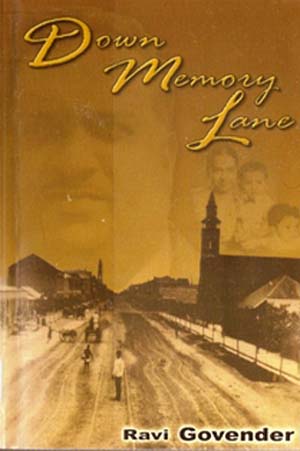Apr 18, 2025
Apr 18, 2025
 My friend Ravi Naicker is a poet and a teacher in Umzinto, Kwa Zulu Natal. I told him about my desire to publish a book of South African poets that would focus on the politics of New South Africa.He immediately asked me to contact his friend Ravi Govender in Durban.
My friend Ravi Naicker is a poet and a teacher in Umzinto, Kwa Zulu Natal. I told him about my desire to publish a book of South African poets that would focus on the politics of New South Africa.He immediately asked me to contact his friend Ravi Govender in Durban.
I called him up and requested him to introduce me to South African poets from Natal who were affected during the apartheid regime. He was enthusiastic and promised me to do the same. The same afternoon I chanced upon Ravi's book, Down Memory Lane at a used book shop in East London. Definitely, this is the same Ravi Govender I had been talking that morning.
Quoting from Radio Lotus FM website '
Govender.....Ravi Govender was born in Victoria Street, Durban just two blocks from the Indian Market on October 17th not too long ago.
He writes two popular columns for POST newspaper - of which he is also on the editing team. He is a public speaker, entrepreneur, serves on the board of a Durban Hospital and also a successful author. His hobbies are rugby, reading and watching movies and he is a Hollywood film buff as well as a James Bond nut. Ravi's favourite actors are Anthony Hopkins and Al Pacino and his favourite movies are The Wild Geese and any 007 movie. His take on Bollywood is that "Priyanka Chopra is the cutest thing on two legs" and he rates Veer Zara as his best Eastern movie.
Ravi has a regular programme 'Off the Shelf' on the Lotus FM which has gained immense popularity over the years.
Down Memory Lane is a book of historic value as it documents events through the eyes of a small boy growing in an apartheid era. This book had me engrossed as pages unfolded the Indian culture that blossomed even in severely restricted conditions of that time.
Aziz Hassim, Award winning Author of the Lotus People writes in his Forward, 'There is a saying that if you forget your past you will be condemned to repeat it. When I read Ravi Govender's essays and his reminiscences about our somewhat chequered history, I marvel at his ability to recall Durban's bitter sweet past with touching finesse and a depth of perception'
Regarding the 'bhais' (gangsters) that prowled the Durban streets during that time, Ravi has aptly named this chapter as 'Bada Bing, Bada Boom'. He writes, 'Some of the cadres that ruled the streets were as follows: Victoria Street where I was sired boasted The Victorians, The Queens Brigade reigned in Queen Street. The Salots which consisted primarily of brothers operated taxis near Kapitan's Balcony Hotel in the Grey Street area. The Dutchins laagered in Old Dutch Road and The Young Americans were united in Bond Street.
They were mostly 'toothless tigers' trying to live off their former reputations. You know the type: one guy initiates an argument and then edges backward into his mate, declaring 'hold me back, hold me back, before I kill him'
Ram Gopal Verma can actually make a film based on such a story in Durban involving such characters.
In his column ' Proudly Indian ' Our contribution to a better world' Ravi recounts, ' November 16 1860,the first vessel, the SS Truro, left Madras, sailed to South Africa and was borne along more through sheer human spirit than spook and diesel.
Another factor attests to our success. Foremost in the life of our forebears was the need for a place of worship and a place for education. Parents still sacrifice their own comfort and luxuries to ensure they give their children a good education and go on to further studies, to enable them to have good careers and be productive citizens. It also serves to preserve the hard earned reputation that Indians have as valuable contributors to this country.
Not bad for people who arrived here to be cane cutters and who have gone on to produce doctors, educators and captains of industry.
Cato Manor is synonymous with the apartheid in South Africa. During 1949 and 1950 when the Group Areas Act was passed on by the government, people were forced to move from the place to townships like KwaMashu and the Indians moved to places like Chatsworth and Phoenix. Cato Manor became an international symbol of resistance to apartheid by Indians.
Ravi has written about forced removals of Indians from a place called Magazine Barracks. He writes 'the murder weapon was the diabolic Group Areas Act and the misery and turmoil caused by its death blow is unpardonable. The action of its perpetrator was unconscionable.'
Ravi Govender's book, Down Memory Lane is an unforgettable narration of the Indian community's resistance to alien laws, their sacrifices and finally their victory over all odds. The present generation of youth in India and overseas have a lot to learn from reading this book, his words continue to inspire us all.
22-Feb-2008
More by : Dr. Amitabh Mitra

|
Can you please let. Me. Have the email of Ravi. Or the contact |